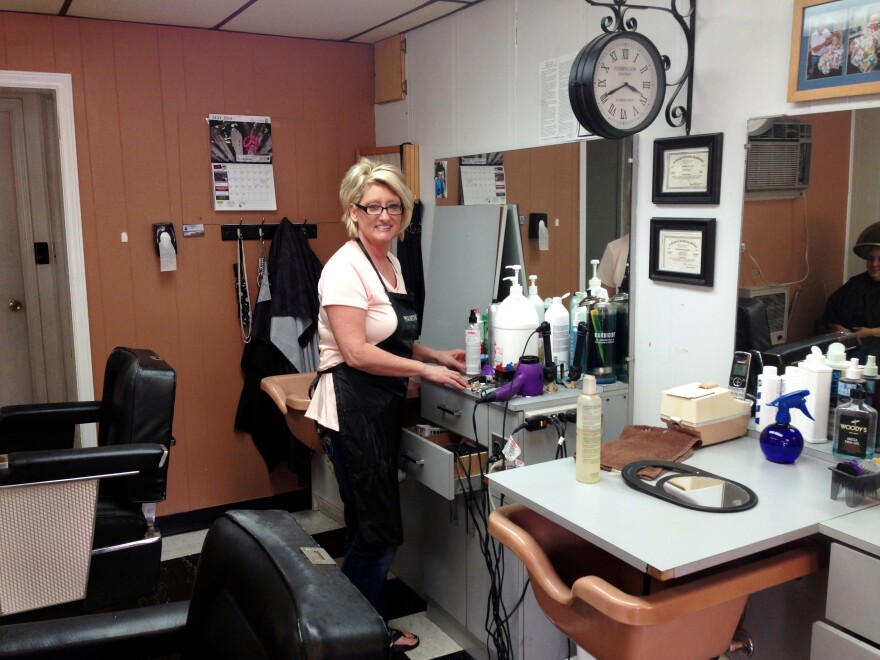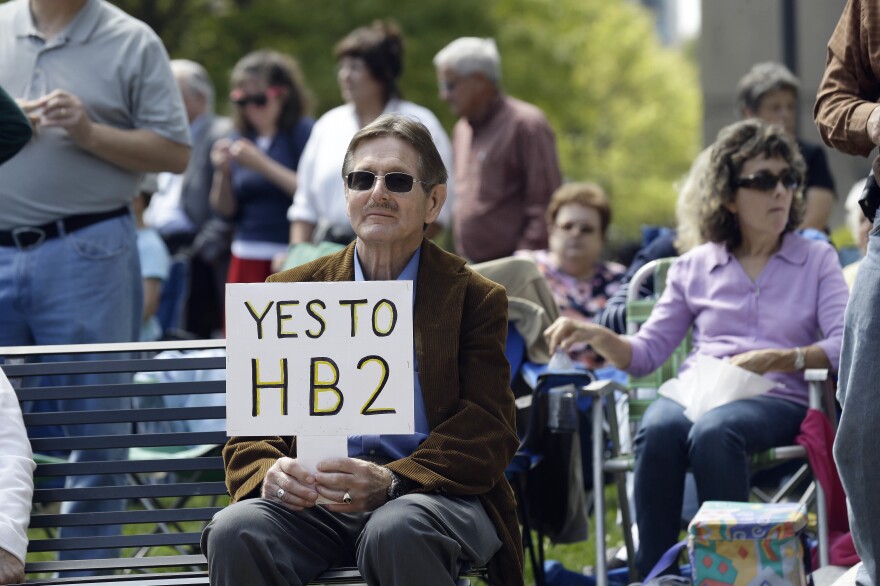North Carolina's controversial law that limits civil rights protections for LGBTQ people has cost the state hundreds of jobs, potentially millions of dollars and widespread condemnation.
Amid the backlash, however, nearly half the people in North Carolina say they support parts of House Bill 2, the state's so-called bathroom law.
In the small rural town of Faith, for instance, residents say their point of view is getting lost in the noise.
The barbershop, Hairport, is one of a handful of businesses on the small road that makes up the town of Faith, population: 800. The shop has existed there for about 50 years, and besides a new coat of paint, not much has changed. The old seats still have ashtrays nestled in the arm rests.
Cosmetologist Chrystal Cretin knows pretty much everyone in Faith, a town that has no stoplights and three churches.
"They're just really good people," she says. "You feel like you've been taken back 20 years when you come here."
It's not her place to judge others — that's for God to decide, Cretin says. She's not bothered by the idea of transgender people using the same bathroom she does. But she says many of the folks in her town are confused.

"A lot of people get transgender people mixed up with pedophiles and rapists and all that," Cretin says. "That's not what a transgender person is. A transgender person is just someone who made a change in their life to be happy with who they want to be. They found their self."
Faith is about 40 miles northeast of Charlotte, the first city in the state to pass an ordinance that would add LGBTQ protections. When North Carolina Gov. Pat McCrory signed HB2 into law, stripping Charlotte and other cities of their authority to pass anti-discrimination measures, the backlash was swift and strong. Opponents say "this is not us."
Next to the barbershop, at the popular lunch spot called simply enough the Soda Shop, Faith resident Katie Funderburk says the real North Carolina is in places like this.
"You have some bigger cities that are very open to gay rights, and that's their thing," Funderburk says. "But as far as when you get to the heart of the South in North Carolina, I think that you have a lot more strong Christian values, and that people side with Pat McCrory on this and feel strongly about this bill and it being passed."
The state is deeply divided over HB2, and it can be tricky to gauge how people feel. It's a wide-ranging law with many different parts. According to a recent poll from Elon University, when it comes to the bathroom provision, 49 percent of residents say they want the state to stop cities from enacting their own protections.
Bill Ferris, an expert on Southern culture, says North Carolina can be viewed as "two states within one."
All across the country, there's an ideological split, says Ferris, a history professor at the University of North Carolina.
"That is the kind of crossroads we're facing," he says. "Are we going to move with a vision of progressive leadership, or are we going to move in another direction that will have severe economic consequences?"
Already, tech giant PayPal stopped plans to create 400 jobs in North Carolina. Deutsche Bank scrapped its expansion plans.
And that's just fine for people like Faith resident Karen Richardson. She's getting her hair colored at Hairport.
"You don't want to come to North Carolina, don't come. Go someplace else," she says, laughing. "Happy the way it is. Leave North Carolina alone."
She says big cities and the federal government are forcing changes that aren't needed.
"They're trying to push it down our throat," Richardson continues. "Just let it be. It was fine before. Why all of sudden is it a big deal?"
She looks at her 2-month-old granddaughter, who sits nearby. Richardson's worried about her future. But right now, the future is in the hands of the courts.
Copyright 2021 88.5 WFDD - Public Radio For The Piedmont. To see more, visit 88.5 WFDD - Public Radio For The Piedmont. 9(MDA5NTM4MTIyMDE0MTg3NDc2MTVlZjdmNQ001))

